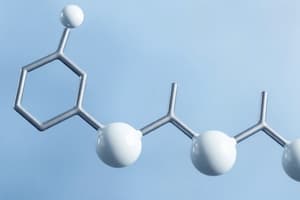Podcast
Questions and Answers
What type of compounds does organic chemistry focus on?
What type of compounds does organic chemistry focus on?
- Compounds with metal atoms
- Compounds with ionic bonds
- Inorganic compounds
- Compounds with carbon atoms covalently bonded with hydrogen (correct)
Why is carbon's ability to form four single bonds significant?
Why is carbon's ability to form four single bonds significant?
- It restricts the types of compounds that can be formed
- It limits the diversity of organic compounds
- It only allows for simple structures
- It permits the creation of complex structures (correct)
What are functional groups in organic chemistry based on?
What are functional groups in organic chemistry based on?
- The smell of the compound
- The color of the compound
- The state of matter of the compound
- Specific arrangements of atoms and bonds (correct)
Which functional group characterizes alcohols?
Which functional group characterizes alcohols?
Why do organic chemists use a common nomenclature system?
Why do organic chemists use a common nomenclature system?
Which elements can carbon atoms be covalently bonded with in organic compounds?
Which elements can carbon atoms be covalently bonded with in organic compounds?
What fundamental class of reaction involves one atom replacing another at the central carbon?
What fundamental class of reaction involves one atom replacing another at the central carbon?
Which type of stereoisomers are non-superimposable mirror images of each other?
Which type of stereoisomers are non-superimposable mirror images of each other?
What is the process called when small molecules leave the compound, resulting in new bonds forming between remaining atoms?
What is the process called when small molecules leave the compound, resulting in new bonds forming between remaining atoms?
Which synthetic strategy involves breaking down targeted molecules into simpler precursors that are joined together sequentially?
Which synthetic strategy involves breaking down targeted molecules into simpler precursors that are joined together sequentially?
What technique is used to distinguish between enantiomers and diastereomers based on their interaction with polarized light?
What technique is used to distinguish between enantiomers and diastereomers based on their interaction with polarized light?
In which field is organic chemistry NOT commonly applied?
In which field is organic chemistry NOT commonly applied?
Flashcards are hidden until you start studying
Study Notes
Exploring Organic Chemistry's Fascinating World
Organic chemistry is a realm within chemical science that focuses specifically on organic compounds—substances containing carbon atoms covalently bonded with hydrogen, as well as other elements like oxygen, nitrogen, sulfur, phosphorus, and silicon. These molecules often originate from living organisms and play vital roles in our everyday life, making them both fascinating and immensely useful. In this exploration of organic chemistry, we'll dive into its unique aspects and key concepts.
Carbon's Special Bonding Capabilities
Carbon has four valence electrons; it can form up to four single bonds through sharing electrons with other atoms. This flexibility allows carbon to create complex structures, leading to diverse organic compounds such as sugars, amino acids, fats, proteins, and nucleic acids, which are essential components of all living beings.
Functional Groups and Nomenclature
Organic chemists classify organic compounds by their functional groups, specific arrangements of atoms and bonds that impart characteristic properties. For example, alcohols contain an -OH functional group, while carboxylic acids possess a COOH functional group. A common nomenclature system helps chemists unambiguously name these molecules based on simplified rules that follow Greek prefixes and suffixes.
Reaction Mechanisms
Understanding reaction mechanisms—the stepwise processes describing how reactants become products—is critical to predicting and controlling reactions in organic chemistry. Some fundamental classes of reactions include:
- Substitution reactions, where one atom replaces another at the central carbon. Common examples include nucleophilic substitutions and electrophilic aromatic substitutions.
- Oxidation and reduction reactions, where electrons are added or removed. These transformations change the oxidation state of carbon and other atoms, affecting molecular properties.
- Elimination reactions, where small molecules (like HCl) leave the compound, resulting in new bonds forming between remaining atoms.
Stereochemistry and Chirality
Stereoisomers—molecules having identical connectivity yet differing three-dimensional spatial arrangement—are crucial to understanding stereochemistry within organic chemistry. Two types of stereoisomers exist: enantiomers (non-superimposable mirror images) and diastereomers (stereoisomers that are not mirror images). Optical activity, rotation polarized light, and chiral separation techniques help identify and distinguish between these forms.
Synthetic Strategies
Synthesis strategies lie at the heart of organic chemistry. Building organic compounds requires efficient methods and strategic plans to minimize side reactions and waste generation while maximizing yield and purity. Key synthetic methodologies include:
- Stepwise syntheses, breaking down targeted molecules into simpler precursors that can be joined together sequentially.
- Combinatorial chemistry, creating large libraries of compounds simultaneously via high-throughput screening techniques.
- Asymmetric catalysis, using chiral catalysts to promote selective reactions producing only one stereoisomer.
Applications and Impact
Organic chemistry holds immense importance due to its applications across various fields, including pharmaceuticals, materials sciences, agrochemicals, cosmetics, perfumes, flavors, food preservatives, and even forensic investigations. Understanding organic chemistry provides insight into how molecules work and opens doors to innovation in these areas. Thus, organic chemistry remains a vibrant, evolving discipline offering endless opportunities for discovery and growth.
Studying That Suits You
Use AI to generate personalized quizzes and flashcards to suit your learning preferences.




